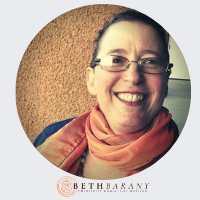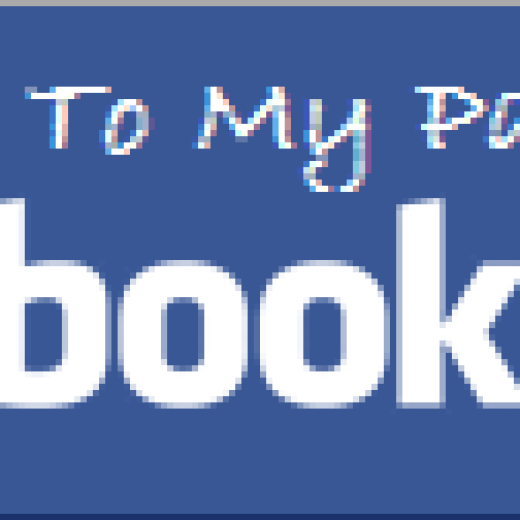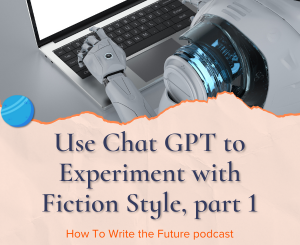Trust Yourself and Get Feedback on Your Fiction, Tips for Publishing Success, Part 2 of 2
In the conclusion of this two-part series on publishing tips, creativity coach and science fiction/fantasy novelist Beth Barany discusses how to trust yourself and how to gain feedback on your writing to help you improve as a writer.
Have a listen to the latest episode on Apple Podcasts | Google Podcasts | Spotify | Buzzsprout | Amazon Music | Podchaser | Podcast Addict | Youtube
ABOUT BETH BARANY
 Beth Barany is an award-winning novelist, master neurolinguistic programming practitioner, and certified creativity coach for writers, including being a workshop leader & keynote speaker. Beth has published books in several genres including young adult fantasy, paranormal romance, and science fiction mystery.
Beth Barany is an award-winning novelist, master neurolinguistic programming practitioner, and certified creativity coach for writers, including being a workshop leader & keynote speaker. Beth has published books in several genres including young adult fantasy, paranormal romance, and science fiction mystery.
Learn more about Beth Barany at these sites:
Author site / Coaching site / School of Fiction / Writer’s Fun Zone blog
RESOURCES
SIGN UP FOR A DISCOVERY CALL
https://writersfunzone.com/blog/discovery-call/
SHOW NOTES
“My work is for people who like adventure set in space with strong female protagonists who are solving complicated problems and there’s some romance.”
In the conclusion of this two-part series on publishing tips, creativity coach and science fiction/fantasy novelist Beth Barany shares about trust and belief in yourself and how to gain feedback on your writing to help you improve as a writer.
ABOUT THE HOW TO WRITE THE FUTURE PODCAST
The How To Write The Future podcast is for science fiction and fantasy writers who want to write positive futures and successfully bring those stories out into the marketplace. Hosted by Beth Barany, science fiction novelist and creativity coach for writers.
Tips for fiction writers!
This podcast is for you if you have questions like:
- How do I create a believable world for my science fiction story?
- How do figure what’s not working if my story feels flat?
- How do I make my story more interesting and alive?
This podcast is for readers too if you’re at all curious about the future of humanity.
TRANSCRIPT for 14. Trust Yourself and Get Feedback on Your Fiction, Tips for Publishing Success, Part 2 of 2
BETH BARANY 00:00
Are you stuck with your story and don’t know how to get unstuck?
Are you a novelist who wishes to be more prolific?
Or maybe you’ve written that first draft and you just don’t know how to make it better.
Then sign up today for a No Obligation Discovery Call with me, Beth Barany Creativity Coach and award-winning science fiction and fantasy novelist.
I look forward to seeing how I can help you.
So sign up today. The link is in the show notes. And now let’s get on with the show.
START
BETH BARANY 00:44
Hi everyone. Welcome to our next episode of How to Write the Future. This is a podcast for science fiction and fantasy writers who want to create optimistic stories because when we vision what is possible, we help make it so.
I’m your host, Beth Barany. I am a science fiction and fantasy writer myself and a creativity coach, focusing on helping science fiction and fantasy authors with their stories.
intro2.
BETH BARANY 01:13
In the last episode, I talked about genre and genre expectations. Once you’ve taken the time to really study your genre and what readers expect. Now it’s time.
To deepen into believing in your vision as a writer and really trusting yourself.
It can be easy to feel. Like you still haven’t quite found your place, that your genre doesn’t quite fit into what the expectations are. So at this stage, you really want to make some conscious decisions. And trust yourself and notice what you like and what you don’t like.
Before you start making any changes. Now I’m assuming. That you’ve written your first draft. And now you’re figuring out.
What is this thing that I have created.
And this really comes with just assessing. What’s important to you. And noticing.
What’s in there because maybe you were trying to please.
Somebody or something. And what’s in there because you truly want
And frankly, this actually leads me into my third tip. I thought I would be creating a third. Episode on this, but one of the ways I test. What I really care about or not is sharing my work with other people.
And this is all about getting feedback.
So once you understand the different genre elements, and once you’re clear about what elements. Are in your story. Then you can be more.
Conscious about what you want to include and what you want to exclude.
When I was first working on.
Into the black, my first science fiction. Mystery. I wasn’t really sure. How much. Of what elements I needed. I mean, looking back, I can see. Course I needed to beef up my science fiction world. But at the time , I wasn’t clear. Which is why we need to get feedback.
So you may be writing science fiction with romantic elements, or you really want to ask yourself, am I writing a romance in a science fiction world?
Or are you writing fantasy with mystery elements or is it a mystery with fantasy elements?
And like I said, because it’s really hard to see our own work, you want to get feedback.
And I understand why it can be very challenging. Asking for help and getting feedback.
What you’ve created is very special to you. Precious. And maybe you’ve been working on it for a very long time. But the fastest way to improve and in art really? And here we’re talking specifically, fiction is for people outside of you. To tell you how it landed for them. Because at the end of the day,
We’re writing. Stories, because we want people to read them. So part of learning how to be. A writer is completing that loop. First. You write it for yourself. Then you write it for the marketplace.
And of course, this may not be true for everyone. And I totally respect that. But most of the writers that I have worked with. They write because they want to be read. I know that’s, what’s been motivating me since I was a small child. And I read books and I. Loved that experience so much. But I wanted to know how to do it.
Also. And so that one day I would be read by other people , And be able to impart the magic of story. Onto them. Where people could go and escape into these worlds and have adventures. Writers I meet. They want to be published. They want their vision to be out into the world. And I imagine this is you too. But they get stalled out and end up chasing their tail because they have not yet gotten any feedback on their work or hardly
Getting feedback does require a certain boldness and a certain bravery. Courage to find people who can give you the right kind of support.
And support can come in several forms. And maybe even more than these that I know of. So here are some of the ways of getting support. You can get beta readers. So these are people who are not writers, but just readers who will read your work and give you feedback?
The other option is to find a critique group. And there are lots of critique groups online, lots of writers organizations also help people find critique partners. And you may know people. Already who might be a good critique group, critique partner. And these are other writers who give you feedback.
Ideally constructive criticism. Honest feedback who can help you improve as a writer.
So there’s beta readers or early readers. You could also call them. I used early readers when I was first starting with my science fiction mystery. And then later on, I got beta readers. I’ve been a part of a critique group for over 20 years and that I’m in a group now that’s been going on for over about 15 years.
I also have cultivated beta readers over the years.
And maybe you only have one other writer that you trade pages with, or maybe you have one other reader that you read your work. And that’s great. You don’t need to do all of it. You really just need to do one of these things at the beginning.
When it comes time to finding a peer critique group, be clear about what you need and what you want. And also what you don’t need and what you don’t want. One of the things to watch out for is, are you really ready for critique? Sometimes I had the tendency of sharing my work a little too soon when really all I needed was thumbs up. Keep going.
I didn’t really need someone to pick apart the writing yet because the story wasn’t finished and it hadn’t jelled in my mind.
So, that is one tendency, but the really, frankly, the other tendency I’ve seen with many of the people who’ve come to me for coaching and for developmental editing is that they have never showed their work to anyone. So find someone that you trust, who can give you feedback that is. Useful and will propel you forward is encouraging also.
It is really no fun to get one’s work back with just all negative comments.
The third is hiring an editor, and there are a lot of different kinds of editors from story editors, to people who will correct your grammar and punctuation. Usually you want to start with someone who can help you make sure that the story you’ve created is strong enough: good characterization; good structure; good plot; good scene by scene flow; voice; pacing.
There’s a lot of elements that go into analyzing a story before we even get to correcting commas and punctuation and spelling and word choice, which comes later. You want to work with an editor, ideally who can help you with the story elements first and sometimes they’re called story editors. Sometimes. They’re called developmental editors and I do developmental editing.
For people who want to learn how to improve the writing so usually I don’t do just straight editing. I work in a coaching teaching frame to help them improve their manuscripts. And there are plenty of people out there you can hire to also just do a developmental work on your manuscript, turn it back to you, and some, some editors also offer a consultation.
So. Let me come back to my second tip, which was about believing in your vision and trusting yourself.
Once you get feedback, now as the time to really.
Trust your gut, trust your heart, trust yourself, about what is your original vision.
If someone tells you what your story should be, they’re usually wrong.
But if they are confused about anything, that’s an opportunity for you to really go back to what it is that you want to create. What are the elements? What’s the mixture that you want to create of the different genres?
If somebody doesn’t understand what you’re working on, it may be that it isn’t clear enough and more often than not what’s lacking is the main character isn’t firm enough.
You don’t know what motivates them, what drives them. That’s one of the areas I’ve seen.
Now some people, especially beta readers, even critique partners, they can review your work and not like something and put it down. Like I have romance elements in my science fiction mystery, and that did not please all of my early readers. Some of them told me it was stupid. Oh, that’s like a high school crush.
But I only got that from some of the men who read my work. Not all of them. Some of them liked fine. But some told me that it was, they put it down. That let me know because I am an avid romance reader and have also written romance. I knew that these romance elements that I had in my story were not for everyone. So that informed me in my marketing. I could add in to the marketing that there are romantic elements in these stories.
Also at the beginning, like I said, I didn’t know if this was a science fiction mystery. Or if it was. Yeah, I didn’t, I didn’t quite know how to cast it now. I feel very confident about saying science fiction mystery.
Part of the challenge was I realized I, okay. I needed to make sure the mystery I was a very strong element, was the central element of my story. And that science fiction was also a strong element, but supported the mystery.
Because I didn’t want my story to feel like it was a mystery slapped onto a science fiction background. Now my readers will be the judge of that, but I think I did a good job integrating the two. But when you pick it up, you know you’re getting a murder mystery set in a science fiction world with romantic elements.
So I came to that understanding because I had people reflect back at me. The different elements that they liked. In some earlier versions of my story there wasn’t enough of the mystery elements and there wasn’t enough of the science fiction. Mostly that’s about deepening my, my, my story, and that had to do with editing.
But it also helped me see what it was I was doing.
Feedback can help you clarify what’s working, and also what you need more of and also who your book is for. And these are all marketing considerations.
My work is for people who like adventure set in space with strong female protagonists who are solving complicated problems and there’s some romance. So of course I said it much more elegantly in my book description.
This particular mix is important to convey in marketing.
I hope that this was useful. I know that everybody’s case is going to be different, and that is why I offer a Discovery Call for people who are curious about working with me.
Go to HowToWriteTheFuture.com to see how to sign up for one of those.
outro
Write long and prosper.
Science fiction and fantasy writers, sign up for your No Obligation Discovery Call and get clarity to your writing process and finish your book.
Loved this episode? Leave us a review and rating here: https://www.buzzsprout.com/2012061
or in your podcast home of choice.
ABOUT BETH BARANY
Beth Barany is an award-winning novelist, certified creativity coach for writers, and a workshop facilitator. In addition to her how-to books for writers, Beth has published books in several genres including young adult fantasy, paranormal romance, and science fiction mystery.
***
Podcast Production by Beth Barany
Show Notes and Transcript Support by Kerry-Ann McDade
***
Connect with Beth Barany: https://twitter.com/BethBarany
CREDITS
EDITED WITH DESCRIPT: https://www.descript.com?lmref=_w1WCA
MUSIC: Uppbeat.io
DISTRIBUTED BY BUZZSPROUT: https://www.buzzsprout.com/?referrer_id=1994465
c. 2022 BETH BARANY
***
For more “How To Write the Future” episodes, go here.
If you’d like to invite Beth onto your podcast, drop her a note here.




